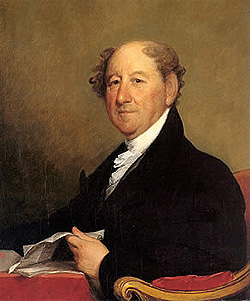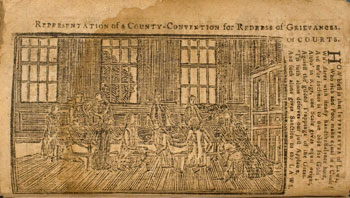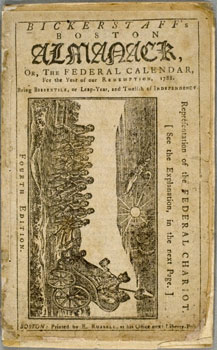People
Rufus King
1755-1827

Rufus King
By Gilbert Stuart, 1820. Courtesy National Portrait Gallery, Smithsonian Institute, Washington, DC
Prologue
The American Revolution and its aftermath defined Rufus King's youth and political career. Born in Scarborough, Maine, a province of the Massachusetts Bay colony, Rufus King came of age in the same year that the United States declared independence. He graduated from Harvard College the following year and began studying law in Newburyport, Massachusetts, with Theophilus Parsons, a talented young lawyer and Whig only a few years older than Rufus. Bright and ambitious, King nevertheless delayed his legal career to serve in the Massachusetts militia at the Battle of Rhode Island in 1778. Passing the bar in that same year, he quickly turned his attention to politics. King was elected to the Massachusetts General Court as a representative from Newburyport. In 1786, he was appointed to represent Massachusetts in the United States Confederation Congress.
A Mere Farce
In the spring of 1786, Rufus King was 31 years old, newly married, and attending Congress in New York City. The national government was floundering, both financially and politically. None of the states were honoring their obligations to support the United States government, which as a result was virtually insolvent. In a candid letter to Elbridge Gerry, recently retired from Congress, Rufus shared his frustrations and fears for the future of the country. "Resolves have been passed upon Resolves--and letter after letter has been sent to the deficient States, and all without the desired effect. We are without money or the prospect of it in the Federal Treasury; and the States, many of them, care so little about the Union, that they take no measures to keep a representation in Congress."(1)
Attendance was so poor that Congress often lacked a quorum to conduct business: "Three days since October only have nine States been on the Floor. Eight are now here, when we shall have nine is a melancholy uncertainty." King believed the Congress should warn the states that, lacking adequate representation, it would have to adjourn. King alternated between anger and embarrassment. "Something of this kind must be done. It is a mere farce to remain here as we have done since last October. Foreigners know our situation and the friends of free Governments through the world must regret it."(2)
Where, King asked Gerry, would "the evils consequent to this inattention in the States terminate? The people of the States do not know their dangerous situation; this torpor and inactivity should alarm the Guardians of the People; but indeed the Legislatures seem the least attentive." King was all too aware of the economic problems plaguing the states and the severe recession, but it stung that his own state was as bad as the others in this respect. "Can there be no means devised whereby Massachusetts can yield something to the common Treasury? Since the organization of the Board of Treasury, the State has paid nothing. We are told of it in Congress--we justify by declaring that past exertions have exhausted us… but poor as we are I hope we could do more than we now accomplish--indeed the State neither pays anything to the federal Treasury, nor supports her Delegates."(3)
Acutely aware of the frustrations and challenges facing the Congress, King nevertheless agreed to serve a second term. "[I]mpressed with the difficulties, and Embarrassments, as well of the united States, as of the individual states composing the Confideracy, I foresee the arduous labors, which they must attempt, who at this period engage in the public Service." King assured Congress that "I chearfully accept the Office; and only lament, that my Abilities are not equal to my love for my country, and to my earnest desire to promote her freedom & happiness."(4)
Tumults and Commotions
Focused as he was on the national problems facing Congress, King also kept a close eye on affairs in Massachusetts. In August, 1786, reading about county conventions and the growing discontent with the economic policies of the state government, King asked Elbridge Gerry, "What does all this mean? Are our country men incapable of a free Government---;or does all originate from the Defect of the federal Constitution?"(5) King wrote to John Adams, who was in London serving as the United States ambassador to Great Britain. King informed Adams that "[y]ou will undoubtedly hear much of the tumultuous and irregular conduct of a considerably numerous class of people in the western counties of Massachusetts." Warning him that "[y]ou will see this business greatly magnified, and Tories may rejoice," King assured Adams that "all will be well"(6)

As citizens gathered at county conventions like the one pictured in this
Bickerstaff's Amanack, a perplexed Rufus King asked his friend Elbridge Gerry,
"What does all this mean?"
More info
In King's opinion, the Massachusetts government had made a bad situation worse by levying extremely heavy taxes on people already struggling to survive the severe post-war recession; "considering the prostrate situation of our commerce, the Government have pressed the subject of Taxes, of the direct Kind, beyond what prudence would authorize." As a result, angry and hard-pressed citizens were marching on the courts:
The operation of these heavy Taxes, in connection with the pressure of the Creditors upon their Debtors for their private Demands has occasioned an Opposition to the judicial Courts in the Counties of, Middlesex, Bristol, Worcester, Hampshire & Berkshire; and the Opposition has been so considerable that in some of these counties, the lower court has been obliged to adjourn without doing any Business.(7)
King thought that Massachusetts government would respond effectively. "The General Court are now sitting, and without Doubt they will pursue such Measures as shall redress all the real Greivances of the People, and establish the honor and Energy of our Government."(8)
King's optimism faded as the fall wore on and the news grew worse. A frightening report of the court closing in Berkshire County prompted an anxious inquiry to Theodore Sedgwick of Stockbridge. "I heard of the Tumults in your county, and confess that I was not a little anxious for your safety---;thank God you escaped their fury." At this point, King's confidence in the ability of the Massachusetts government to handle the rapidly deteriorating situation was clearly waning. "What the Legislature will do I think is very uncertain; indeed their situation is somewhat embarrassing. I have no Doubts in my own mind what the line of their Duty is, yet it is by no means clear that they will view the Subject as it appears to me."(9) In the same letter, King confided to Sedgwick his deepening pessimism regarding the character of the people themselves.
I myself have been an Advocate for a Government free as air; my Opinions have been established upon the belief, that my country men were virtuous, enlightened, and governed by a sense of Right & Wrong. I have ever feared that if our Republican Governments were subverted, it would be by the influence of commer[c]e and the progress of Luxury.
Events now seemed to indicate that Americans perhaps lacked sufficient virtue for enlightened self government.
But if… the great Body of the people are, without Virtue, and not governed by any internal Restraints of Conscience, there is but too much reason to fear, that the Framers of our constitutions, & Laws, have proceeded on principles that do not exist, and that America, which the Freinds of Freedom, have looked to as an Asylum when persecuted, will not Afford that Refuge, which their hopes & wishes have suggested.(10)
Always an industrious correspondent, King surpassed himself during the fall and winter of 1786-87, posting letter after letter to Massachusetts contacts asking for news. He told Daniel Kilham, a Newburyport selectman and old Harvard classmate, that Congress was "extremely anxious to be informed of every step taken by the Legislature at this critical juncture of the Government." King lectured Kilham that the fate not just of the state but of the United States depended in large measure on how the Massachusetts government handled the rebellion: "What measures you will pursue to preserve the commonwealth, it is your Duty diligently to Enquire. Wisdom & Fortitude ought most highly to distinguish the present Assembly. Upon what they do, or omit, in an eminent Degree must depend the national safety. The evil is of great magnitude, and the Remedy must be equally extensive or wholly inefficacious."(11)
King criticized the state for neglecting to take the uprising seriously when it was in its early stages. That inattention had proven all the more dangerous due to "the Dangerous principles avowed by the Leaders of the Insurgents." According to King, the insurgents, or, as they preferred to call themselves, Regulators, operated under a distorted interpretation of the natural rights identified in the Declaration of Independence. They had as their goal nothing less than a total redistribution of property.
These men publicly avow the Opinion---that all America, which was formerly under the British Government, and now within the United States, was acquired by the People of the United States & by their joint exertions; that all men being by nature equal, the Property ought to be equally divided among all the Citizens of the United States; and that upon the principles of this acquisition, and the Dissolution of the Government existing before the Revolution, all Debts contracted before that period are annihilated, and any attempts to inforce their payment are attempts for Plunder and Robbery.(12)
Lest Kilham think King's fears unfounded, King assured his friend that these alarming allegations were not mere rumors: "I have the best authority for affirming that these pernicious principles are cherished and industriously propagated by the leaders of the Insurgents."(13) Only strong measures by the Massachusetts government could rescue the Commonwealth from collapsing into chaos:
"If when opinions so fatal to the Commonwealth are openly taught and justified, they who by their office are bound to watch for the safety of the Government, content themselves with limited Applications, and detail reforms, when the Evil is general, and the Dissease has possessed itself of the Vitals---;there is good reason to despair of the Commonwealth and to give all up to wild Anarchy & confusion."(14)
King urged Elbridge Gerry to "[p]ersevere and you will restore the authority of Government." The harsh measures taken by Governor James Bowdoin, his Council and the House of Representatives to quell the insurrection met with King's approval. The General Court suspended Habeas Corpus, issued a Riot Act, and authorized the creation of an army of militia under the command of General Benjamin Lincoln. Lincoln's four-thousand-man army marched west toward the United States Arsenal at Springfield, but arrived too late to take part in the bloody encounter of January 25 between local militia commanded by General William Shepard and an army of insurgents led by Captain Daniel Shays.(15)
The Times Are Becoming Critical
The Massachusetts insurrection confirmed Rufus King's worst fears for Massachusetts and the future of the United States. In his mind, these "commotions" and their consequences were "the most important subject that ever came before" the Confederation Congress. He believed that "[e]very member considered himself as personally interested in it." As for King himself, he declared that there was nothing less at stake than "life, liberty and property."(16)
On February 21, 1787, Rufus King introduced in Congress a resolution calling for a convention composed of delegates from each state in the union "to revise the articles of confederation." The goal of the convention, already scheduled to meet that May in Philadelphia, would be "to render the federal constitution adequate to the exigencies of the Union." King wrote to Gerry that delegates from Massachusetts should be carefully chosen: "For Gods sake be careful who are the men; the times are becoming critical."(17)
In the midst of dealing with the aftermath of the rebellion, the Massachusetts legislature chose not one, but four delegates to attend the convention at Philadelphia: Rufus King, Caleb Strong, Elbridge Gerry and Nathaniel Gorham. King's visibility and experience in Congress made him a natural choice to serve. Convinced of the need for a stronger federal government, he emerged as one of the strongest supporters of the proposed Constitution. King was deeply disappointed and angered by Elbridge Gerry's refusal to sign the document."(18)
As a member of the Massachusetts ratifying convention, Rufus King lobbied strenuously for ratification. Although Shays' Rebellion was over, former Regulators and their sympathizers were very much in evidence at the convention. In a letter to James Madison, King lamented that among many delegates, there was "apprehension that the liberties of the people are in danger, and a distrust of men of property or education have a more powerful effect upon the minds of our opponents than any specific objections against the Constitution." In King's opinion, the same animosity that had "emboldened them to take arms ag[ainst] the Government seems to have an uncontroulable authority over a numerous part of our Convention."(19) Their objections, he complained,
are not directed against any part of the constitution, but their Opposition seems to arrive from an Opinion, that is immoveable, that some injury is plotted against them, that the System is the production of the Rich, and ambitious; that they discern its operation, and that the consequence will be, the establishment of two Orders in the Society, one comprehending the Opulent and Great, the other the poor and illiterate.(20)
King ruefully noted that "[t]he extraordinary Union in favor of the Constitution in this State of the Wealthy and sensible part of it is in confirmation of these opinions and every exertion hitherto made to eradicate it, has been in vain."(21) King admitted that he was unsure of whether the opposition outnumbered those favoring ratification; he and other Federalists had made a concerted effort to avoid questions that would expose the deep divisions among the delegates. He staunchly declared to Madison, however, "[w]e by no means despair."(22)
On February 6, 1788, after extended debate, Massachusetts became the sixth state to ratify the new United States Constitution. The vote to ratify passed by a mere 19 votes. King wasted no time in sharing the news with fellow Federalists, writing to both James Madison and George Washington that same day. King was particularly pleased and frankly relieved at the "good temper" of the large minority who had opposed ratification. Having seen only a year earlier just what an angry opposition could do to destabilize a government, King was happy to report that those who had voted against the Constitution nonetheless promised that they would "devote their Lives & property to support the Government."(23)

Rufus King rejoiced with Federalists throughout the country when Massachusetts became
the sixth state to ratify the new United States Constitution on February 6, 1788.
More info
Epilogue
Rufus King's career after 1788 continued what had become a life-long commitment to public service. Believing he had seen in Shays' Rebellion a government on the threshold of dissolution and chaos, King remained a strong Federalist for the rest of his life. His political fortunes reflected those of his party, which began to decline following Thomas Jefferson's election as president in 1800. Moving to New York in 1788, King was a senator in the first United States Congress in 1789. He later served as the United States ambassador to Great Britain. He again served as a senator for New York from 1813 – 1825. Rufus King died in 1827, at the age of 72.
About This Narrative
Note: All narratives about people are, to the extent possible, based on primary and secondary historical sources.
See Further Reading for a list of sources used in creating this narrative. For a discussion of issues related to telling people's stories on the site, see: Bringing History to Life: The People of Shays' Rebellion
| Print | Top of Page